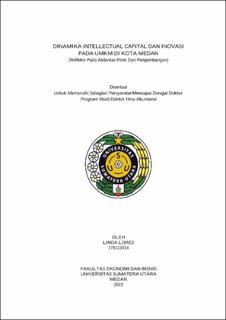| dc.description.abstract | The general objective of the research is the construction of Intellectual capaitalin MSMEs entities, which is in accordance with the entity's characteristics. Specifically, this research aims to understand: 1). the essence of Intellectual capaitaland Innovation, for MSMEs entities with research and development activities in the business life cycle; 2). development of Intellectual capaitalaccounting based on the contextual environment; and 3). the use of Intellectual capaitalin creating assets that make MSMEs entities have business value. This research was conducted in an interpretive paradigm with a case study approach in knowledge-based organizations, namely MSMEs entities in the city of Medan. The data collection methods used were interviews, observation and documentation. This research produced three findings. First, the Intellectual capaitaldimensions found are in accordance with the characteristics of MSMEs entities, including human capital, structural capital, relational capital, spiritual capital, and social capital and intellectual property. The Intellectual capaitalframework that has been developed is a six-dimensional model which includes human capital, structural capital, relational capital, spiritual capital, social capital and intellectual property. This model reflects a nuance of spirituality that helps create trust for MSMEs entities. Second, the development of Intellectual capaitalaccounting is realized in the practice of recognition and disclosure. Trust-oriented Intellectual capaitalAccounting is a process of identifying and classifying, recognizing and disclosing Intellectual capaitalwhich supports the business development of MSMEs entities and is based on moral values, including those produced for the creation of strength in the form of a mainstay of business of MSME entities with characteristics. in order to achieve the trust and expectations of all stakeholders. Intellectual capaitalis recognized nominally and non-nominally. Intellectual capaitalis reported in a report visually and narratively. The trust-oriented Intellectual capaitalreport that was successfully constructed in this research presents the goal orientation of achieving a value with indicators of increasing wealth and trust, Intellectual capaitalcategories, resources owned, efforts made, and the results of these efforts, for each period. Third, that Intellectual capaitalaccounting is useful in creating assets or business mainstays which become a source for gaining business trust. Assets that support a business in the short term will become a business strategy to achieve competitive advantage. | en_US |





